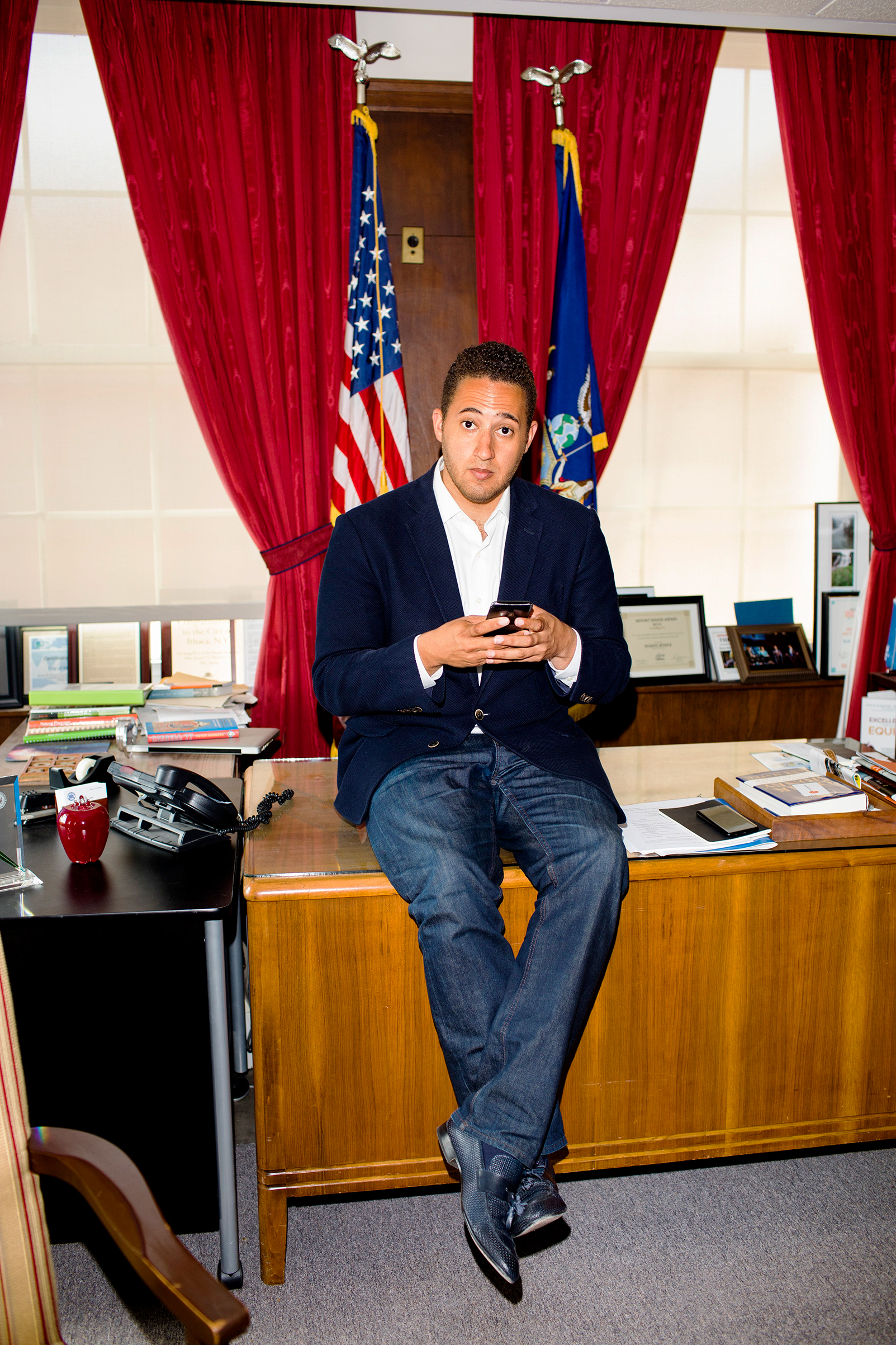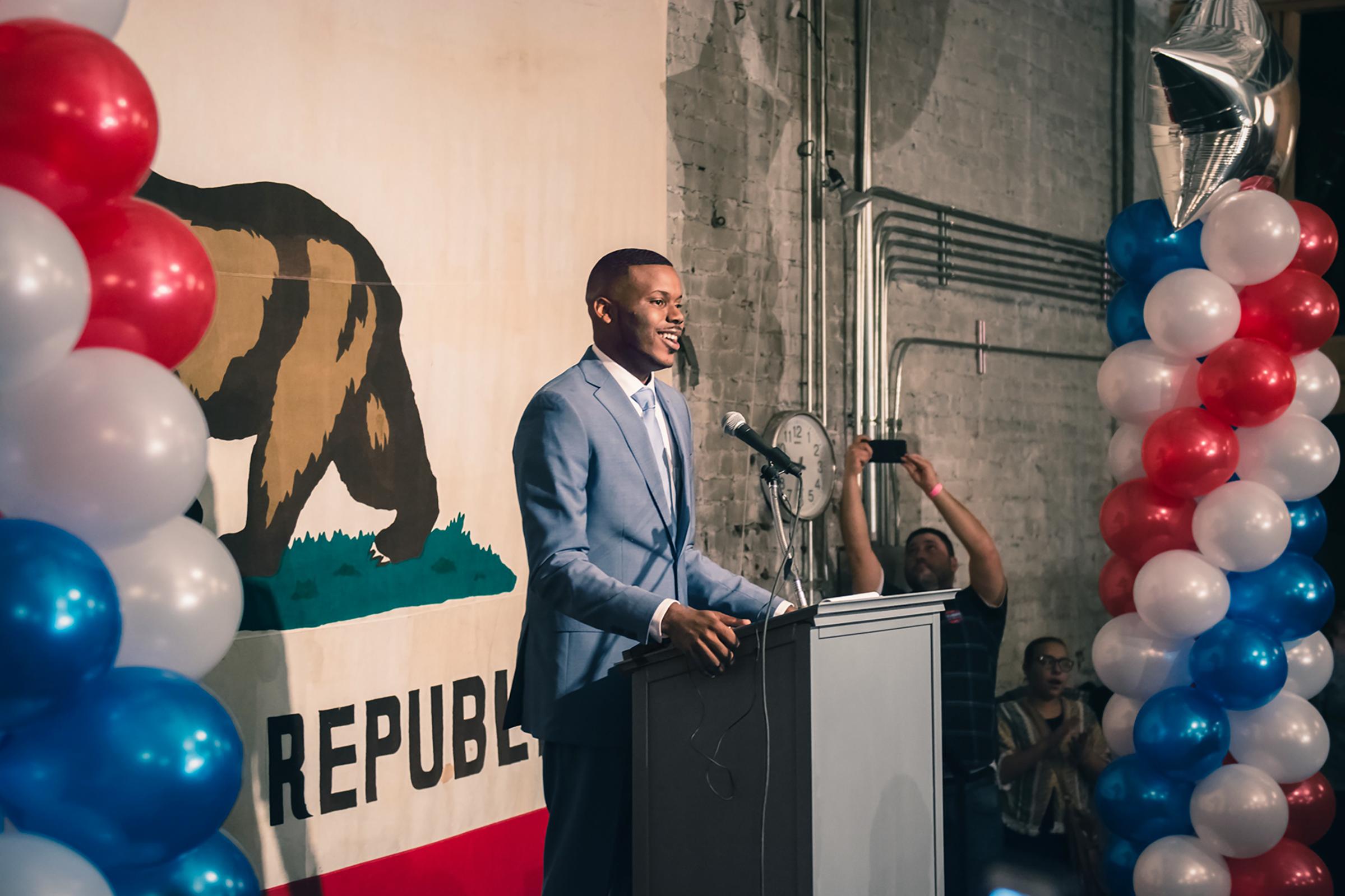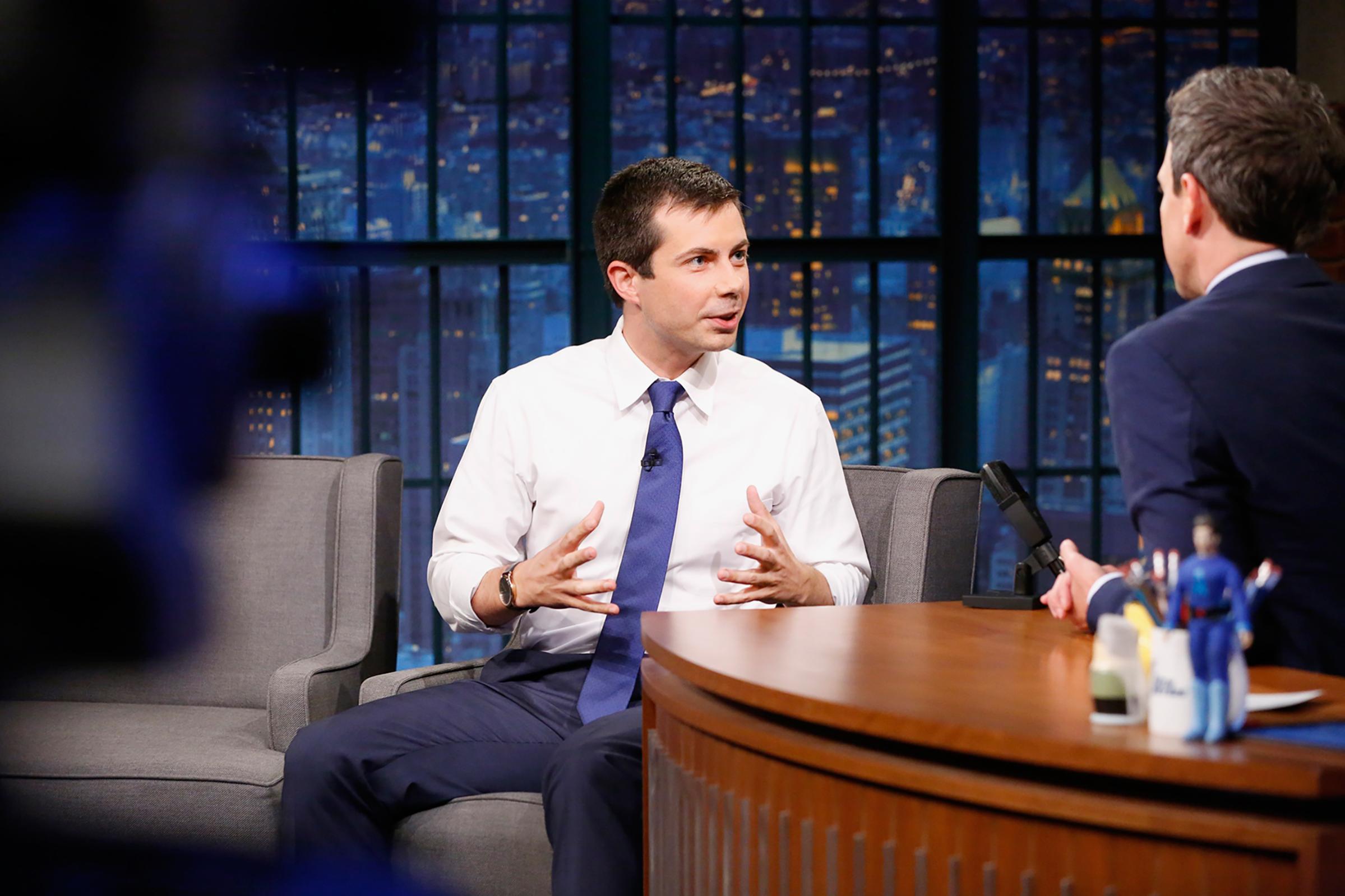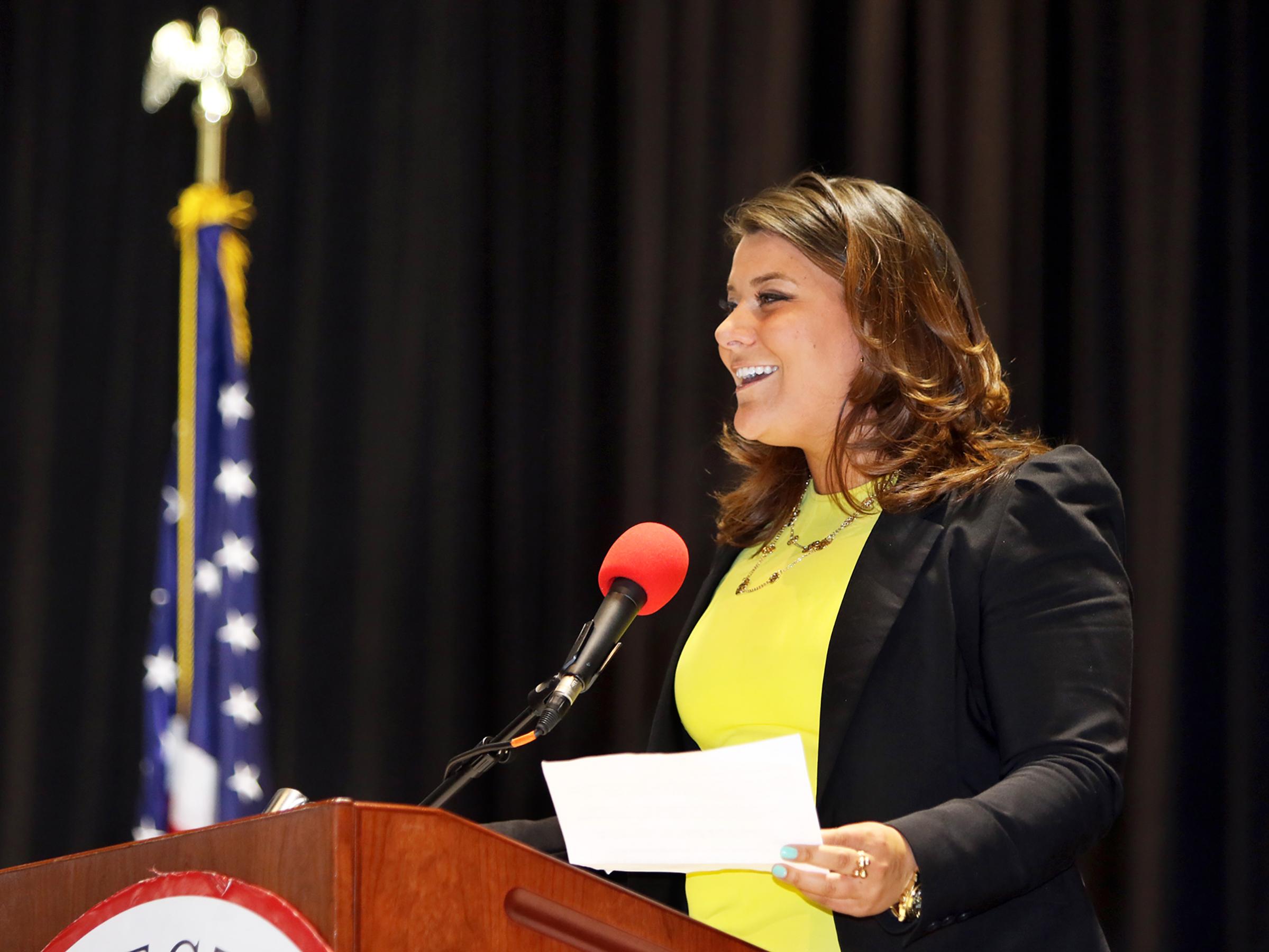
The “Hall of Justice” has just two rules: A nightly game of beer pong, and a ban on talking politics after 8 p.m. The seven-bedroom house in upstate New York was home to a motley crew of government nerds–county legislators, city-council members, Ph.D. students and one big guy called “the Mayor.” Svante Myrick got the nickname because he was always bigfooting decisions and hogging the remote control. But also because in 2011, at 24, he became the youngest-ever mayor of Ithaca, N.Y.
“The youngest generation is pretty sure that we can do it better than the folks that have been doing it for a long time,” says Myrick, who was re-elected in 2015 with 89% of the vote. “And the folks that have been doing it for a long time are pretty sure that the youngest generation has no idea what we’re doing.”
Young people have always rolled their eyes at the received wisdom of the olds, but now they’ve got numbers on their side. Millennials–born between 1980 and 2000–overtook baby boomers as the largest segment of the U.S. population in 2015, yet they are led by one of the most geriatric federal governments in history. Donald Trump, at 71, is the oldest President ever elected to a first term. On Capitol Hill, the average ages in the House and Senate were 49 and 53 in 1981; today they’re 59 and 62. Nearly half of Senators defending their seats in 2018 will be over 65 on Election Day, including California’s Dianne Feinstein, who recently announced that she’ll run for re-election at 84. More than half of the Supreme Court was born before you could buy a color TV.
The Founding Fathers framed America as a representative democracy, yet the largest living generation has the least representation in Washington. Trump was propelled into office by older voters, but many of his policies so far weigh heaviest on millennials, who voted against him by a double-digit margin and overwhelmingly disapprove of his presidency. When Trump banned transgender troops from military service, some of the loudest outcry was from young people, who are twice as likely as boomers to identify as LGBTQ. When Trump and his Attorney General Jeff Sessions, 70, ended the Deferred Action for Childhood Arrivals program shielding 800,000 young undocumented immigrants from deportation, the effect will be mostly felt among millennial immigrants and their cohort. When 22 GOP Senators–with an average age over 65–pushed Trump to withdraw from the Paris Agreement, it appalled many young people, who tend to be the most concerned about climate change.
So far millennials have not responded by running en masse for federal office. And in state legislatures, they account for just 5% of seats nationwide. They have, however, planted flags at the local level, where government tends to be most accountable and least partisan. And lately, municipal governments are picking up the slack dropped by Washington on issues important to millennials like immigration and climate change. Whether a harbinger of change or merely natural succession, their growing prominence in local government casts the gulf between Washington and cities as a generational divide as well.
“When I talked to young people and asked, ‘Would you consider running for any office?,’ they’d say, ‘Maybe mayor,'” says Shauna Shames, an assistant professor of political science at Rutgers University and the author of Out of the Running: Why Millennials Reject Political Careers and Why It Matters. National politics requires too much fundraising, she explains, and local office seems like a surer way to make a mark.
There’s even a new sitcom on ABC about a young rapper who finds himself running city hall. “You look for some way where you can actively effect change,” explains Hamilton star Daveed Diggs, an executive producer of The Mayor. “The place where it feels like you have the most control is within our communities, with the people you interact with every day.”
That would help account for the surge of young candidates targeting down-ballot races. Almost 11,000 millennials have asked about running for state and local office through Run for Something, a new Democratic-affiliated political organization aimed at recruiting young candidates. Emily’s List, a group that supports pro-abortion-rights female candidates, has been approached by nearly 19,000 potential candidates this year, including half of them under 45.
To the extent they are inspired by former President Obama and antagonized by Trump, these young upstarts might revive a Democratic Party that holds fewer seats in Congress than at any point since 1946. But either way, time will put an end to baby-boomer dominance and make way for a new generation of leaders who could shape the nation in ways not yet imaginable.
In search of a preview of what might change, TIME interviewed 11 millennial mayors, plus dozens of other young elected officials–Democrats and Republicans, veterans and teachers, city dwellers and small-town leaders. No two were alike, but what they had in common–a preternatural ease with technology, an appetite for collaboration and impatience with reflexive partisanship–offer hints of a future they are eager to shape. “We have to snatch the torch,” says Brandon Scott, a 33-year-old member of the Baltimore city council. “It’s never been passed.”

As a political novice with zero executive experience, the 29-year-old mayor of South Bend, Ind., nonetheless took office feeling the weight of expectations. “When you run for office in your 20s, your face is your message,” says Pete Buttigieg, now 35 and halfway through his second term. “You are going to be the candidate of new ideas, technology and innovation. Even if you don’t have any new ideas and don’t like technology.”
Fortunately, millennials are often fluent in both. And the chance to put ideas immediately to work is what makes local office attractive. “Ours might be the first generation of mayors who don’t necessarily consider state and federal government a step up,” says Buttigieg, an openly gay Afghanistan veteran who recently ran for chair of the Democratic National Committee. “A generation ago, folks like us wouldn’t run for local office in the first place–we would go to law school, try to work for a Congressman and then try to be a Congressman.”
Once in city hall, the young mayors say, they wasted no time. Confronted by the glut of abandoned properties in South Bend, Buttigieg demolished or repaired 1,000 of them in 1,000 days. Unemployment has fallen nearly 10 points under Compton, Calif., Mayor Aja Brown, 35, by requiring companies in the L.A. basin city to hire more locals. Alex Morse, the 28-year-old mayor of Holyoke, Mass., got a passenger rail station built and increased the city’s carbon-neutral power generation to 85%, with an aim to be totally carbon-neutral by 2020. Mayor Michael Tubbs, 27, recently convinced Amazon to build a 600,000-sq.-ft. facility in Stockton, Calif. And Matt Gentry, the 28-year-old Republican mayor of Lebanon, Ind., has a version of a “swear bucket” in his office: if you explain a decision with “That’s how it’s always been done,” you have to put in 25¢.
It’s not just the vigor of youth. “Millennials work in a very different way,” says Daniel Lopez, who worked for older politicians in Sacramento before joining Tubbs’ staff. “These young people don’t want to wait for a year to go by before tackling challenges. They want to try it now.”
In government, that attitude can have unintended consequences. “You have no management experience when you’re just entering your professional career,” says Erin Stewart, the 30-year-old Republican mayor of New Britain, Conn. When she was elected at 26, she tried to reorganize city government, but admits she didn’t get it right at first. “I had very high expectations,” Stewart says, adding that she was asking too much of longtime staffers and initiating too many new projects. She realized she had to listen to more experienced city employees before making changes.
That can be frustrating for a generation raised to believe that anything from taxis to dating could be hacked. “Government is not designed to move fast,” says Tubbs, the youngest mayor of a U.S. city with more than 100,000 people. “If you prototype something and it fails, it’s just an internal conversation in your office. If I prototype water delivery or trash, it touches everyone, especially the most vulnerable.”
That doesn’t mean these mayors are leaving their phones at home. Young leaders insist on making government as wired and social-media-savvy as its citizens. An hour before each city-council meeting in New Britain, Stewart sits down in front of her computer and launches a Facebook Live to update residents on the agenda–new plans for paving roads, hiring police officers and building bridges–and answer their questions in real time. “Let’s not spend money on a bridge!” one resident comments. “When it collapses,” the mayor replies, “you’ll wish we spent it, lol.”
The videos can get hundreds of comments and more than 3,000 views, not bad in a city of 73,000. “We’re averaging all these views, but we can’t get two people to show up to city hall,” says Stewart.”That’s fine, I’ll bring government to you.”
On the other side of the country, in Compton, Brown hosts virtual town halls on her official Facebook page and posts photos of her husband’s homemade dinners on Instagram. In Ithaca, Myrick has turned to social media to crowdfund city projects like the July 4th fireworks display. Buttigieg had to introduce new software to improve coordination between South Bend’s city agencies, he says, because “I was getting all my crime stats by fax.” And Morse describes switching Holyoke city emails to Gmail and computers to Macs as “little things that, as a young person, seem normal to me.”

To other young people, these changes make local government seem less musty. They don’t have to show up to municipal meetings to get in touch with their representatives. “We see ourselves in him,” says Harold Grigsby, 20, an intern in Tubbs’ office who never considered politics until meeting him. “If he can do it, I can do it. He’ll tweet right back at you.”
But there can be downsides to the intimacy of social media, particularly when it meets the porous boundaries of public life. Before she settled down with her fiancé, Stewart took a stab at Tinder. “Surprisingly, there are quite a few other elected officials on Tinder as well,” she says. “I definitely swiped left.”
Others are explicit about avoiding the unfiltered risks of social media. Myrick speaks to the hazards, though not in terms typically heard on C-SPAN. “We realized that there were lingering consequences to something you wrote on AIM or MySpace or Facebook,” he says. “I didn’t think there was ever a moment in my life when I felt the kind of anonymity that some people do when they’re in a club with their shirt off, like doing lines of cocaine off their best friend’s butt.”
Stockton Police Chief Eric Jones is updating Tubbs on the latest crime stats when a server delivers a bowl of unfamiliar beans to their table. “What do I do with this?” asks the chief, who has been serving in the Stockton police department for almost as long as Tubbs has been breathing. You use your teeth, Tubbs explains, and then demonstrates how to eat edamame.
In 2012, when Tubbs was a senior at Stanford and first planning his successful run for city council, 71 people were killed in Stockton, a higher per capita murder rate than in Chicago or Afghanistan. That year, Stockton also became the largest municipality in America to declare bankruptcy. In the years since, Tubbs and Jones–a young black man and a middle-aged white cop–have developed an unlikely friendship. Together, they built a coalition of community leaders, law enforcement, social workers and concerned citizens to create a violence-prevention task force called South Stockton Promise Zone. In the five years since they started, homicides and gun crimes fell significantly before recently stabilizing.
When Tubbs was first elected, he didn’t know that building the South Stockton Promise Zone would entail negotiating a truce. “Being so young, I didn’t realize many of these organizations were at war with each other,” he said. He got them to work together by cracking jokes and pooling resources.
Pragmatism is a trait that runs across the generation, says Morley Winograd, co-author of Millennial Momentum: How a New Generation Is Remaking America. “Millennials approach a task by forming a team to take it on,” he says, describing a method that suits government work. “The difference between boomers and millennials is that one wants to do it in a win-lose way, the other wants to do it in a win-win way.”
Elections, of course, are win-lose affairs, yet elected millennials appear uncommonly comfortable questioning their parties. Buttigieg expressed doubts about Democratic strategies for reviving the Rust Belt economy, and Myrick, who campaigned as a surrogate for Hillary Clinton, said he’s not surprised her message didn’t resonate. Stewart, the Republican mayor of New Britain, Conn., keeps a picture of Obama in her office. Like almost all the mayors interviewed, she says she feels “inspired” by the former President. She also says Trump has made the office into a “joke.”
“I get along better with younger Republicans than some older Democrats,” says Daniel Riemer, 30, a Democratic state representative in Wisconsin. U.S. Representative Elise Stefanik, 33, a Republican from upstate New York, worked with young Democratic colleagues to push for legislation to make college more affordable and advocate for stronger action on climate change. “Older elected officials have aged during so much gridlock and partisan fighting,” she says. “I just think my generation doesn’t want to see the extreme partisanship that we’re seeing.”
That said, Trump’s election may have inspired even more young Americans to enter the arena. A 2013 survey by the Bipartisan Policy Center and USA Today found that only 13% of them had seriously considered running for office. But in 2017, young people are now more inclined to say politics is relevant and that it creates tangible results, according to a biannual Harvard survey. There’s even a new lobby, the Association of Young Americans (AYA), billed as the “AARP for young people,” to push for action on climate change, student debt, criminal-justice reform and voting rights. “Everyone has lobbyists and the ability to put consistent pressure on legislatures,” says AYA founder Ben Brown, “except for young people.”
They truly are the sleeping giant of U.S. politics. Although millennials and boomers each account for about 30% of Americans, boomers hold 55% of seats in statehouses, compared with millennials’ 5%. Gen X and the Silent Generation, which sandwich boomers, are represented proportionally to their numbers. But that’s a snapshot, not a trend line.
“There is almost no research done on the generational demographics of these offices,” says Amanda Litman, who co-founded Run for Something. “We know that barely 5% of state legislators are under the age of 35, but beyond that, it’s anyone’s best guess.”
That age has long marked the threshold at which youth is surrendered to the more somber slogs of adulthood. The Constitution also marks it as the minimum age required to be President, which means the oldest millennials, at about 36, have now achieved that requirement, at least on paper.
The Ithaca Commons was one of those problems that everyone acknowledged but nobody fixed. The pedestrian mall, built in 1974, obstructed access to decades-old electric utilities and water lines that hadn’t been updated in a century. Obviously, the Commons had to be ripped up and realigned, but nobody wanted to deal with the fallout of turning an area with 150 businesses into a multiyear construction zone. His predecessor had commissioned designs for renovating the commons, but Svante Myrick bit the bullet.
It wasn’t easy. Construction went over budget and lasted longer than expected. Myrick had to get creative with funding: he wrangled $4.5 million in federal transit money by presenting the Commons as a walkway between two bus stops. For more than two years, local business owners were furious that the construction hurt their revenue, pedestrians hated the eyesore, and angry residents packed city meetings and wrote nasty letters to the local paper. But now that the new Commons is complete and business is booming, some of the project’s fiercest critics have become its biggest supporters.
“I think the decision to do it was a youthful one,” Myrick says of his plan. “Because I was naive about how easy it would be, and because I was like, ‘What’s two years of pain if we can get this right for 100 years?'” That perspective, from the ripe old age of 30, may capture the core of the millennial political attitude to date: ambition bordering on arrogance, with an insistence on getting things done.

It is an approach born of youthful optimism. Julián Castro was elected mayor of San Antonio at 34 before serving as Secretary of Housing and Urban Development under Obama. He says that in some ways, inexperience made him a better leader: “It made me see the glass as half full. I was more positive and less jaded. You’re not discouraged by years and years of having butted your head up against a wall and not gotten results, so you’re more willing to try.”
Given the dire economic prospects facing a generation defined by moving back in with the folks, it’s a wonder that millennial politicians are so upbeat. “The baby boomers were handed by the Greatest Generation the wealthiest nation that anybody had ever seen,” says Myrick. “And they’re passing down to us colleges that leave us $120,000 in debt, roads that look worse than they did in 1950, airports that look worse than they did in 1960 and schools that feel worse than they did in 1970.”
His explanation: “That generation of leadership–from Reagan to now–was afraid to tell the American people to ‘ask not what your country can do for you, ask what you can do for your country.'”
For someone born nearly a quarter-century after JFK’s death, Myrick does a pretty credible impression of the nation’s freshest-faced President. But then he takes a turn for the solemn. Millennials, he says, are more politically similar to their grandparents, who fought World War II, than their boomer parents. “Financial adversity and scarcity and austerity, and being shocked into a global awareness, means that our generation is primed and prepared for greatness,” he says.
He’s not joking.
More Must-Reads from TIME
- Donald Trump Is TIME's 2024 Person of the Year
- Why We Chose Trump as Person of the Year
- Is Intermittent Fasting Good or Bad for You?
- The 100 Must-Read Books of 2024
- The 20 Best Christmas TV Episodes
- Column: If Optimism Feels Ridiculous Now, Try Hope
- The Future of Climate Action Is Trade Policy
- Merle Bombardieri Is Helping People Make the Baby Decision
Write to Charlotte Alter at charlotte.alter@time.com